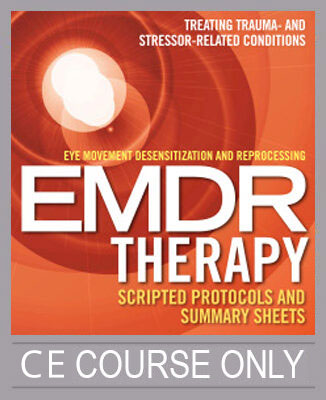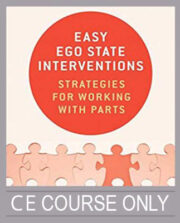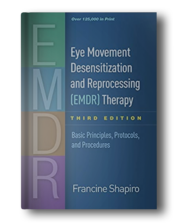Treating Trauma- and Stressor-Related Conditions – Marilyn Luber Book Study (12 CE Hours)
$99.00
This Home Study Program offers an opportunity to earn 12 CE hours (EMDRIA, Psychologists, LCSW, LMFT, LMHC, LPC and other master’s level clinicians. Check with state licensing board to confirm acceptance of NBCC credits). The book itself (not included) is the educational content of this program. By passing the CE program quiz developed for this program, you will demonstrate that you have gained knowledge by reading this book.
The book is not included in the purchase of this CE program. To purchase a copy of the book, click HERE or HERE.
by Marilyn Luber, PhD
book purchased separately
EMDR Therapy is a psychotherapy approach based on standard procedures and protocols. Using EMDR standard procedures and protocols as its template, this book presents step-by-step scripts that enable new practitioners and seasoned EMDR clinicians, trainers, and consultants alike to incorporate EMDR Therapy into their case conceptualizations and treatment plans while working with patients who have issues related to trauma- and stressor-related conditions. These scripts can be put to use immediately and retain the complete integrity of EMDR Therapy by presenting the three-prong protocol (past memories, present triggers, and future templates) and the 11-step procedure essential to the standard practice of EMDR Therapy. They reinforce the specific parts, sequence, and language used to create an effective outcome, and illustrate how clinicians are using this framework to work with a variety of therapeutic difficulties and modalities while maintaining the integrity of the Adaptive Information Processing (AIP) model.
This text covers the use of EMDR Therapy with such conditions as reactive attachment disorder, PTSD, acute stress disorder, and persistent complex bereavement disorder, as well as with traumatized patients with psychosis, trauma in emergency (911) telecommunicators, and compassion fatigue. Scripts and summary sheets simplify the gathering of information and ensure documentation in clients’ charts in a consistent format. This facilitates quick retrieval of the essential issues and components needed by clinicians to create appropriate treatment plans and easy access to client information.
(Click here to preview the book’s table of contents.)

Marilyn Luber, PhD is a licensed clinical psychologist and has a general private practice in Center City, Philadelphia, Pennsylvania, working with adolescents, adults, and couples, especially with complex posttraumatic stress disorder (C-PTSD), trauma and related issues, and dissociative disorders. Dr. Francine Shapiro trained her in Eye Movement Desensitization and Reprocessing (EMDR). She was on the Founding Board of Directors of the EMDR International Association (EMDRIA) and served as the Chairman of the International Committee until June 1999. She conducts facilitator and consultation trainings and teaches other EMDR-related subjects both nationally and internationally. Dr. Luber was given a Humanitarian Services Award by the EMDR Humanitarian Association. Later, in 2003, she was presented with the EMDR International Association’s award “For Outstanding Contribution and Service to EMDRIA” and in 2005, she was awarded “The Francine Shapiro Award for Outstanding Contribution and Service to EMDR.” In 2009, she edited Eye Movement Desensitization and Reprocessing (EMDR) Scripted Protocols: Basics and special situations (Springer) and Eye Movement Desensitization and Reprocessing (EMDR) Scripted Protocols: Special populations (Springer). Since then, she has published multiple highly regarded collections of scripted protocols on a range of topics.
Learning objectives:
|
|
Key Features:
|
|
WHAT’S AVAILABLE?
|
Instructions after purchase of book study program:
1. After completing your purchase, you will receive an email receipt verifying your purchase with a link to a quiz based upon the book’s content.
2. For your convenience, you will be provided a downloadable PDF version of the quiz to use while you read.
3. To earn your CE hours, you must answer the quiz questions online.
4. When you complete and pass the quiz, you will be issued a downloadable certificate for EMDRIA and NBCC approved Masters Level professional certificate with CE hours documented
EMDR International Association:
EMDR Advanced Training & Distance Learning, LLC is an EMDRIA Approved Credit Provider (#07002) and maintains responsibility for this program and its content in accordance with EMDRIA standards.
National Board for Certified Counselors:
EMDR Advanced Trainings & Distance Learning, LLC has been approved by NBCC as an Approved Continuing Education Provider, ACEP No. 6709. Programs that do not qualify for NBCC credit are clearly identified. EMDR Advanced Training and Distance Learning, LLC is solely responsible for all aspects of the program..
American Psychological Association:
Advanced Psychotherapy Trainings (APT) is approved by the American Psychological Association to sponsor continuing education for psychologists. APT maintains responsibility for this program and its content.


The book is not included in the purchase of this CE program. To purchase a copy of the book, click HERE or HERE.
Cancellation/Refund Policy: Requests for program purchase cancellation/refund must be in writing to info@emdradvancedtrainings.com no later than 2 weeks after registering for the program. Refunds will be 75% of purchase price. No refund will be given for requests made past this timeframe or for those programs for which the attendee has already obtained CE hours.
Note: you should receive an automatic confirmation email for your order. If you do not, please check your spam filter and/or tabs. If you still cannot find your receipt, please email info@emdradvancedtrainings.com.







